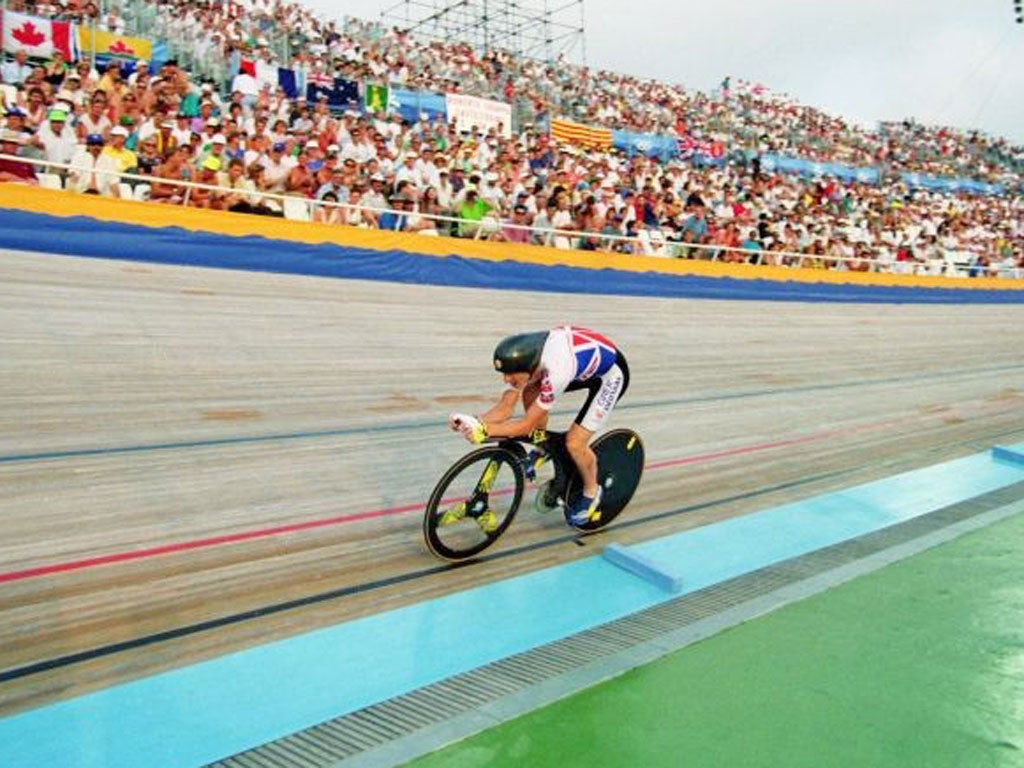Chris Boardman: My gold set a standard for British cycling. Now, we lead the way
Before the 92 Games, a Brit had not won gold on a bike for 72 years. Chris Boardman remembers how he ended the hoodoo

Your support helps us to tell the story
From reproductive rights to climate change to Big Tech, The Independent is on the ground when the story is developing. Whether it's investigating the financials of Elon Musk's pro-Trump PAC or producing our latest documentary, 'The A Word', which shines a light on the American women fighting for reproductive rights, we know how important it is to parse out the facts from the messaging.
At such a critical moment in US history, we need reporters on the ground. Your donation allows us to keep sending journalists to speak to both sides of the story.
The Independent is trusted by Americans across the entire political spectrum. And unlike many other quality news outlets, we choose not to lock Americans out of our reporting and analysis with paywalls. We believe quality journalism should be available to everyone, paid for by those who can afford it.
Your support makes all the difference.I was very aware, sitting on the start line of the 4,000 metres individual pursuit at Barcelona, that the next four and a half minutes could completely change my life. There had been two years of intense focus leading up to the event that, to be honest, was more mental than physical. Yes, I'd train, but I'd also spend a lot of time thinking: "Should I be resting now?"or "Should I be going out?"
It had been mentally tough – and in five minutes I'd know if it was worth it. Oh, and there would also be millions of people watching at home.
At the Games, my form had been brilliant. I beat the Dane Jan Petersen in a new world-record time, and then smashed that in the semi-final against the Commonwealth champion, New Zealand's Gary Anderson. I should have been supremely confident, but I didn't have much confidence at all.
I had had just 30 minutes' rest after the semi-final before the final started. At the time, Great Britain was not renowned for Olympic velodrome prowess, as our last cycling gold was way back in 1920. I kept thinking: "British people don't win medals."
In those spare minutes before the race started, I spent ages chatting to the sports psychologist John Syer, who would later work with Tottenham Hotspur. He helped me realise that I couldn't influence anything I couldn't control. So, in essence, I was taking part in a race but I wasn't really trying to win it; I was just trying to be the best I could be.
When we set off for real, I could see after the first kilometre I was catching up. I knew my competitor Jens Lehman and I knew he always set off fast and then slowed down. So, I knew I needed to stay calm, not get worried, and once I was ahead, I could stay there.
It took until near the end of the race to actually believe I would overtake him, though. That is something that so rarely happens in the individual pursuit. But even then, there were still doubts in my mind – anything could happen, be it a puncture or the like, so I didn't take anything for granted.
When I look back, it's hard to explain how I felt taking the gold. I shook people's hands as I cooled down and I took my medal but, to be honest, I felt rather cheated by the whole thing. I'd seen all the medal ceremonies on TV and I'd always thought "I'd like a bit of that" but it was all a bit of a blur.
It didn't really sink in with me until some months later when I was cycling near my home in the Wirral. I went past someone who stopped and shouted my name. He recognised me and it was only then that I realised what I had achieved, that I had actually won the gold medal at the Olympics. Not many people do that. Groups of people win World Cups in football but so few individual people win an Olympic gold medal.
It set a precedent for British cycling. It had been such a long wait for gold. But we had also been innovators. My bike had been designed by Lotus Engineering: they started from scratch to try to produce the perfect bike. I trained in wind tunnels, which was unheard of back then. And it all paid off. Nowadays all of that is standard, and Britain leads the way.
Chris now runs his own company, Boardman Bikes, which sells 56 different models of bikes across the UK. Chris Boardman was talking to Andy Mortimer
This series is being run in conjunction with Richard House Children's Hospice. Richard House is based in the Olympic borough of Newham. It caters for children with life-limiting, life-threatening and complex healthcare conditions. Visit facebook.com/richardhousech
Join our commenting forum
Join thought-provoking conversations, follow other Independent readers and see their replies
Comments